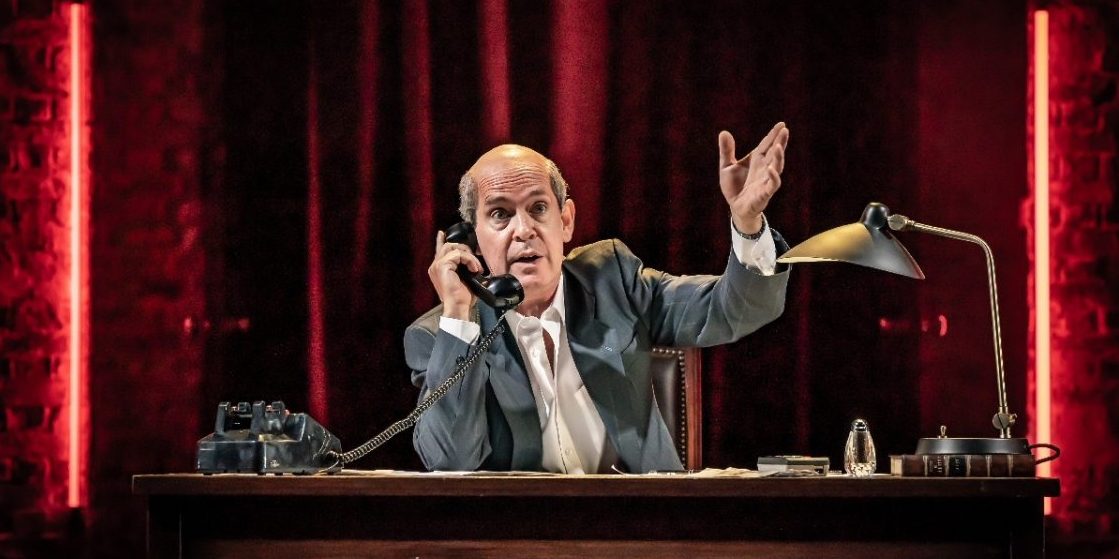This new play from Peter Morgan could not be more topical, though to everyone’s credit the lessons and pointers are oblique rather than obvious. The evening focuses on the rise and fall of one of the most famous of Russian oligarchs who found prominence in the 1990s – Boris Berezovsky. Other leading figures, such as Roman Abramovich and Alexander Litvinenko, are also in the mix; but ultimately the focus is on the emergence of Vladimir Putin from a minor functionary to an authoritarian leader, and what this tells us about patriotism. Who, if any, of these figures, can over a twenty-year span be said to have cared for their country, as opposed to themselves? And can patriotism ever really be a moral virtue?
Designer Miriam Buether has created a cruciform thrust stage with further levels above and below and an imposing set of double doors at the back. The contrast between the external formality of corridors of power and a sleazy nightclub within is deliberate and reflective of the issues of the play – how the Russian state declined into an era of casino capitalism after the fall of the Soviet Union. At the heart of it is Berezovsky, whom we first see handling multiple telephone calls and at the peak of his power, pulling the levers of deals for mind-spinning sums and using his influence with Boris Yeltsin’s coterie to promote his own people and create a cooperative political environment for oligarchs.
Much of this is very entertaining, with witty dialogue and short punchy scenes that convey a huge amount of exposition of recent Russian history – perhaps too much in a long first half. But what carries it through is a bravura performance by Tom Hollander in the central role which switches between ingratiating charm, bullying domineering, and brilliant comic timing with effortless skill. Director Rupert Goold keeps up the pace from scene to scene with many sharply etched vignettes of other leading players, though perhaps there are too many strands running at the same time. This is the central challenge in any historical drama – too much detail obfuscates and clogs the action, whereas too little risks over-simplification.
The tone darkens in the second half as Berezovsky over-reaches and fails to learn the lesson that the kingmaker never gets to wear the crown. This shift is flagged up memorably just before the interval as Berezovsky turns on his former acolyte, Abramovich. These longer confrontational scenes centre on the rise of Putin, portrayed with studied brilliance by Will Keen. This depiction is an object lesson in how to embody a leader of the present day without resorting to caricature. We see Putin mutate through the play from shambling and insecure provincial to swaggering potentate, through a repertoire of physical gestures, studied silences, and vicious outbursts that are wholly convincing.
So the second half has a Shakespearean intensity to it, as Putin forces Berezovsky into an exile that diminishes him ultimately into a powerless, if still affluent, a protestor. It all reminds you of Prince Hal’s rejection of Falstaff in ‘Henry IV’. Alongside this largest shift, other role reversals take place in a minor key. Abramovich segues neatly from one mentor to another completing his own betrayal of Berezovsky, and Litvinenko breaks with the Russian secret service to become Berezovsky’s ally in England before meeting the grisly end with which we are all familiar. Jamael Westman brings a quiet dignity to this last role that impresses, as does Yolanda Kettle as his wife; but these remain rather underwritten parts. The always excellent Luke Thallon, as Abramovich, expertly describes the trajectory from shy hero-worship through to confident cynicism. And a final nuanced viewpoint is offered by Ronald Guttman as Berezovsky’s mathematics professor, with whom he has wistful episodic exchanges that hark back to the latter’s original plan for a career in academic mathematics working – ironically – on decision theory.
Elsewhere there is strength in depth in the minor characters and slick, professional touches to the production values, particularly in the vivid accuracy of costume choices and expert choice of music, whether sentimental patriotic ballads or lurid heavy metal, that evoke powerful cultural chaos and conflict of Russia in the 1990s.
This is a production that contains tumultuous multitudes. Perhaps its reach is further than its grasp, but in such important subjects that is no bad thing if it leaves the audience with much to ponder and reflect upon.

